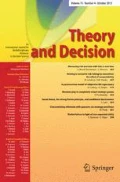Abstract
This paper investigates, in a simple risk-sharing framework, the extent to which the incompleteness of contracts could be attributed to the complexity costs associated with the writing and the implementation of contracts. We show that, given any measure of complexity in a very general class, it is possible to find simple contracting problems such that, when complexity costs are explicitly taken into account, the contracting parties optimally choose an incomplete contract which coincides with the ‘default’ division of surplus. Optimal contracts with complexity costs are constrained efficient in our model. We therefore interpret our results as saying that, in the absence of a strategic role for complexity costs, their effect is entirely determined by their size relative to the size of payoffs.
Similar content being viewed by others
REFERENCES
Abreu, D. and Rubinstein, A. (1988), The structure of Nash equilibrium in repeated games with finite automata, Econometrica56: 1259-1281.
Aghion, P. and Tirole, J. (1997), Formal and real authority in organizations, Journal of Political Economyforthcoming.
Aghion, P., Dewatripont, M. and Rey, P. (1994), Renegotiation design with unverifiable information, Econometrica62: 257-282.
Anderlini, L. (1989), Some notes on church's thesis and the theory of games, Theory and Decision29: 19-52.
Anderlini, L. and Felli, L. (1993), Incomplete written contracts: undescribable sates of nature, Theoretical Economics Discussion Paper TE/93/263, STICERD, London School of Economics.
Anderlini, L. and Felli, L. (1994), Incomplete written contracts: undescribable sates of nature, Quarterly Journal of Economics109: 1085-1124.
Anderlini, L. and Felli, L. (1997),Costly coasian contracts, C.A.R.E.S.S.Working Paper No. 97-11, University of Pennsylvania.
Blum, M. (1967), A machine-independent theory of the complexity of recursive functions, Journal of the Association of Computing Machinery14: 322-336.
Chung, T. Y. (1991), Incomplete contracts, specific investments, and risk sharing, Review of Economic Studies58: 1031-1042.
Cutland, N. J. (1980), Computability: An Introduction to Recursive Function Theory. Cambridge University Press, Cambridge.
Dye, R. A. (1985), Costly contract contingencies, International Economic Review26: 233-250.
Grossman, S. J. and Hart, O. D. (1986), The costs and benefits of ownership: a theory of vertical and lateral integration, Journal of Political Economy94: 691-719.
Hart, O. D. and Holmström, B. (1987), The theory of contracts, in T. F. Bewley (ed.), Advances in Economic Theory, Fifth World Congress, Cambridge University Press, Cambridge.
Hart, O. D. and Moore, J. (1988), Incomplete contracts and renegotiation, Econometrica56: 755-785.
Hart, O. D. and Moore, J. (1990), Property rights and the nature of the firm, Journal of Political Economy98: 1119-1158.
Maskin, E. and Tirole, J. (1996), Dynamic programming, unforseen contingencies, and incomplete contracts, Harvard University (mimeo).
Nöldeke, G. and Schmidt, K. M. (1995), Option contracts and renegotiation: a solution to the hold-up problem, RAND Journal of Economics26: 163-179.
Piccione, M. (1992), Finite automata equilibria with discounting, Journal of Economic Theory56: 180-193.
Rogers, H. (1967), Theory of Recursive Functions and Effective Computability. McGraw-Hill Book Company, London.
Rubinstein, A. (1986), Finite automata play the repeated Prisoner's Dilemma, Journal of Economic Theory39: 83-96.
Rubinstein, A. and Piccione, M. (1993), Finite automata play a repeated extensive game, Journal of Economic Theory61: 160-168.
Segal, I. (1995), Complexity and renegotiation: a foundation for incomplete contracts, Harvard University (mimeo).
Tirole, J. (1994), Incomplete contracts: where do we stand? Technical report, IDEI, Toulouse.
Author information
Authors and Affiliations
Rights and permissions
About this article
Cite this article
Anderlini, L., Felli, L. Incomplete Contracts and Complexity Costs. Theory and Decision 46, 23–50 (1999). https://doi.org/10.1023/A:1004917722235
Issue Date:
DOI: https://doi.org/10.1023/A:1004917722235



